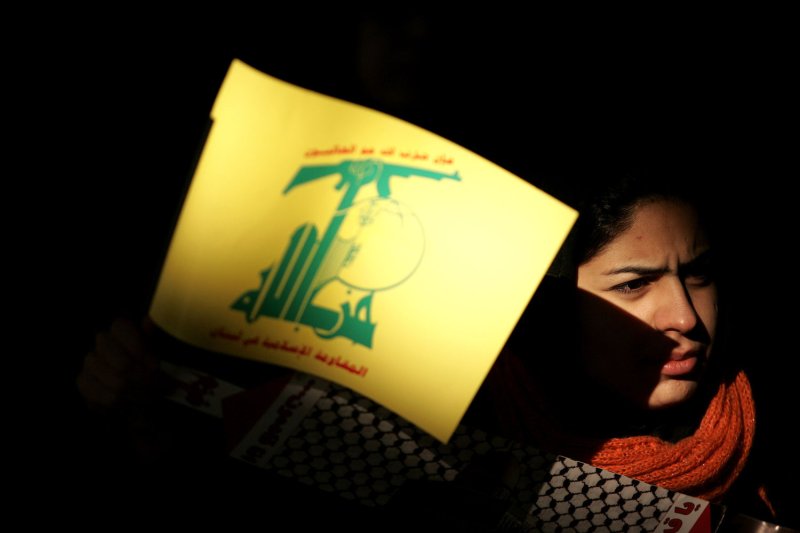An Iranian woman holds a poster with Hezbollah's signas she attends a demonstration at Tehran university in Tehran, Iran on February 2, 2009. (UPI Photo/Mohammad Kheirkhah) |
License Photo
BEIRUT, Lebanon, Nov. 22 (UPI) -- Hezbollah's roll-up of an alleged CIA operation in Beirut has given the Iranian-backed movement an immense boost at a time when its ally, the Syrian regime in Damascus, is fighting for survival.
The Shiite Muslim Hezbollah is considered the prime suspect in the Feb.14, 2005, assassination of Rafik Hariri, Lebanon's most prominent statesman, five-time prime minister and a Sunni.
Four of Hezbollah's members, including two senior figures, have been indicted by a U.N.-mandated court, the Special Tribunal on Lebanon, which sits in the Netherlands.
If the suspects are convicted, even in absentia, Hezbollah would suffer a severe blow that could trigger a spasm of sectarian bloodletting in Lebanon between Sunnis and Shiites and both sides' Christian allies.
Hezbollah denies involvement in the suicide bombing of Hariri's motorcade in downtown Beirut that killed the Sunni leader and 22 other people.
But, if it was responsible, as the largely circumstantial evidence suggests, it's highly unlikely it would have carried out such a high-profile assassination, with the immense political repercussions for Damascus, without the approval of the Syrian leadership.
At that time, Damascus claimed Hariri, backed by the United States and France, was organizing a multi-sect Lebanese campaign to end Syria's 30-year quasi-occupation of Lebanon.
Hezbollah, although a creature of Iran's Revolutionary Guard Corps, has long been Syria's key proxy in Lebanon and carried out suicide bombings against the Americans, French and Israelis that were in Syria's interests.
The movement depends on Syria for its supply route from Iran and as a major supplier of weapons, most notably long-range missiles capable of hitting all of Israel.
The U.S. reports over the last several days about how Hezbollah's formidable counterintelligence arm was able to uncover CIA recruitment of its personnel and expose an entire CIA network to infiltrate the movement's security apparatus indicate that Hezbollah crippled the U.S. operation.
"Beirut station is out of business," one CIA source was quoted as saying by the Los Angeles Times Sunday.
By all accounts, the CIA was forced to curtail undercover operations in Lebanon in the summer while the extent of the damage could be assessed and other assets were protected.
Much remains unclear, including the scale of the damage. So is the fact that the CIA admitted to such a blunder in the first place.
Old Beirut hands are surprised the Americans handed Hezbollah, a longtime enemy that before Osama bin Laden came along had killed more Americans than any other militant group in the Middle East, such high-profile, look-good headlines.
Hezbollah was responsible for one of the CIA's biggest disasters. Eight operatives, including visiting Middle East chief Robert Ames and Beirut station chief Kenneth Haas, were killed April 18, 1983, when a Hezbollah suicide bombing rammed a truck with 2,000 pounds of explosives into the U.S. Embassy in Beirut. All told, 63 people were killed.
Hezbollah leader Hassan Nasrallah boasted in June that his security people had nabbed at least two members who'd been recruited by the CIA. The Americans pooh-poohed that report at the time. But now they're not only saying it's true but that it was an espionage disaster on a grander scale.
Those old Beirut hands remain skeptical about what's going on. The Lebanese capital has been an espionage battleground for decades, all smoke and mirrors where few things are what they seem.
It's difficult to determine whether the CIA was able to penetrate Hezbollah's upper echelons and acquire high-grade intelligence. Even the Israelis, who hate Hezbollah even more than the Americans, aren't believed to have done that.
Nasrallah insisted in June the CIA penetration was at the lowest level but the organization has been deeply concerned about its security since its iconic military chief, Imad Mughniyeh, was assassinated in a heavily guarded neighborhood of Damascus Feb.12, 2008.
Hezbollah, Syria and just about everyone else blamed Israel's intelligence service, the Mossad but there have been lingering suspicions ever since that Mughniyeh, the world's most wanted terrorist fugitive until 9/11, was betrayed from within.
Hezbollah's security has been drastically overhauled since then.
Hezbollah and Lebanese authorities have also arrested more than 150 people, including senior army officers and prominent political figures, on charges of spying for Israel, with Hezbollah the primary target.
By any standards that's a massive network -- and it must be presumed others remain at large.





